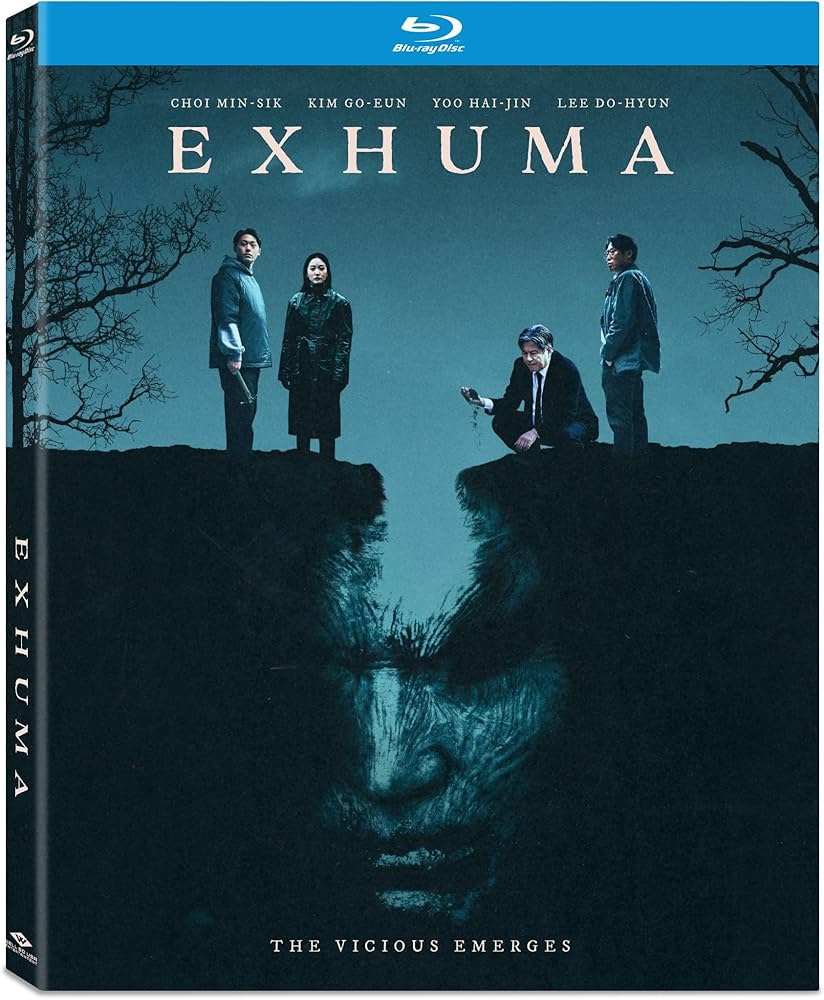Exhuma begins when a well-to-do Korean-American family solicits help from a geomancer and his team of shamans to aid in discovering why their infant is in constant unrest, hospitalized and crying non-stop. The world-weary geomancer (Choi Min-sik of Oldboy and I Saw the Devil) discovers that the source of the disturbance is at an ancestral burial ground where the family’s great-grandfather has been interred. In the process of relocating the grandfather’s remains, one of the workers disrupts the gravesite unleashing the ire of an angered spirit. But what they don’t realize is that beneath the family grave lies an even darker and more ancient secret that will threaten to destroy them all.
Exhuma is a film steeped in folklore, ritual and ancient history. But as an interesting dichotomy, it also keeps one foot grounded in the modern world. Our spiritual advisors are not sacred, withered monks sequestered away in crumbling temples. To them, it’s a business, a service they provide to ensure that deceased love ones are at rest at a nominal fee. At the same time though, they take what they do very seriously. In the film’s first half, we feel a growing sense of dread as they prepare a complicated ritual to extract the bones of the family’s great-grandfather and move them to a cleansed site. The ritual seems alien to us. It isn’t really explained what’s happening. There’s chanting, odd rhythmic movements, strange robes and streamers, all while men are slicing into pig carcasses as a kind of transferal of the effect of digging into cursed soil. And just when we think all has gone according to plan, a worker severs a small serpent within the burial hole which emits an ear-piercing shriek which the shamans can sense from far away. It’s all gone wrong. But just how wrong, they have yet to truly discover. The second half of the film shifts into a very different animal both in tone and theme. It barrels forward as a high-concept monster movie with fantastical flourishes and a socio-political commentary on the prickly relationship between the Japanese and Koreans due to Japanese occupation in Korea in 1910 through the end of WWII. Visually Exhuma exudes a slick, stylish Hollywood-esque visual look with only occasional spotty CGI effects and is a nice match for the tone of the film
Well Go USA has provided yet another crisp, clean digital transfer that allowed the muted tones of the film to resolve naturally with no distortion while exhibiting very deep, consistent black levels. For audio, we have the original Korean track presented in Dolby Atmos surround and the English dub captured in Dolby 5.1 surround. Personally I wasn’t a big fan of the English dub which I felt disrupted the somber, serious tone of the film a little. The Atmos and 5.1 alike really get a work out during certain points of the film and help heighten the immersion during the more atmospheric sequences. Unfortunately the extras are predictably rather light, primarily a trailer and a series of very short press kit-style ‘making of’ featurettes. I would’ve really liked a commentary that went into more detail around the production and the history of Japan and Korean and its significance to the film.
Exhuma is an excellent, atmospheric and haunting film that offers a fresh take on the ghost hunting genre while embedding a deeper meaning beneath the surface, and Well Go USA has given a great technical presentation to the film that’s worthy of its epic dread. Exhuma is definitely recommended for those who are fascinating with occult practices of Asian spiritualist traditions and how they are brought into a modern context, or even folks who dig a film that introduces a creeping dread that explodes into bombastic horror.

